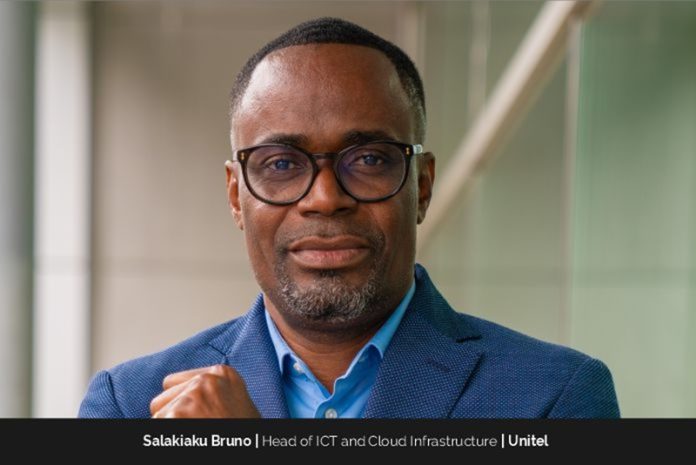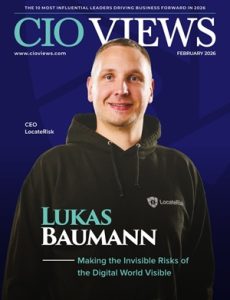Introduction
Salakiaku Bruno, Head of ICT and Cloud Infrastructure for Unitel, is an esteemed professional responsible for planning, deployment and maintenance of the company’s critical technology infrastructure, ensuring robust, scalable, and secure systems that support Unitel’s expansive network.
By driving the expansion, modernisation and growth of Unitel’s infrastructure, Salakiaku plays a pivotal role in solidifying the company’s mission to provide high-speed, high-quality connectivity to its consumers. Under his leadership, several key initiatives, namely building a strong, capable ICT and cloud team, driving continuous technological upgrades, and next-generation digital solutions, have been initiated.
Innovation in Technology
Salakiaku’s journey into ICT and cloud infrastructure began long before he even had regular access to computers. Growing up in Angola, technology wasn’t as close at hand as it might have been elsewhere, which in a way made him even more curious. He was drawn to electronics and physics, and spent hours tinkering with devices, often in his older cousin’s small repair shop for radios and TVs. He learned to troubleshoot failures, rewind transformers by hand, and bring broken machines back to life. It wasn’t glamorous work, but it taught him something that no textbook could.
There were days when he had to walk more than 15 kilometres to get to school. At home, his parents made one thing clear, i.e. giving up on education was never an option. His experiences help him build resilience, discipline, and a mindset that later became the foundation of the professional he is today.
His uncle, an engineer in telecommunications, made him inquisitive about what was possible with networks and connectivity. That inspiration ultimately led him to pursue his degree in Electrotechnics, with a specialisation in Telecommunications, and later a Master’s in Electronics and Telecommunications.
A defining moment came early in his professional life when a director, who later became a mentor, handed him a project that seemed far too big for a junior. He was tasked with leading the implementation of an intelligent network platform from scratch. It was daunting, but it became one of the most transformative experiences of his career. The success of that project not only boosted his confidence but also ignited a sense of responsibility that still drives him today.
Cloud infrastructure, in particular, gained his interest because it represents that blend of problem-solving and possibility; it’s about building systems that are resilient, scalable, and transformative, just like the journey he has lived.
For him, ICT and cloud infrastructure aren’t just about servers or code; they’re about creating the kind of connectivity and innovation that can reshape lives, especially in places like Africa, where the digital future is still being written.
Experience at Unitel
Salakiaku started working at Unitel Listening as he hadn’t completed his degree yet. While working at the company’s call centre, within a year, some of his colleagues noticed his curiosity and technical inclinations. They allowed him to transition into the engineering team. This step marked his true entry into ICT at Unitel, where he began as a technician for the Intelligent Network. From there, the journey accelerated, and he went on to manage NGIN (Next Generation of Intelligent Network) services, lead the Charging System and Roaming operations, oversee IT Infrastructure, and eventually specialise in cloud infrastructure.
Future Of Work
The most transformative project Salakiaku has had the privilege to lead at Unitel was the restructuring of their data centres. It was about preparing Unitel for the future, ensuring resilience in the present, and proving that in Angola, they could build an ICT foundation as sophisticated as any global operator.
When he first stepped into this challenge, their infrastructure was straining under the weight of rapid growth. Every day, new projects were being launched by different business units, and customer expectations for speed, reliability, and innovation were rising. Yet, behind the scenes, their systems were fragmented. Networks were configured manually on each host. Static routes were added one by one, introducing both delays and risks. Backups were squeezed through 1Gbps links, causing bottlenecks. Also, integrating best practices for platforms like Oracle RAC or VMware was becoming increasingly difficult in such a patchwork environment. Troubleshooting, meanwhile, was often complex and time-consuming due to the lack of a standardised topology.
The realisation hit and it shaped their vision, i.e. to create a federated, active-active data center architecture, complemented by a private cloud with automation at its core. The goal was 99.999% availability, faster provisioning of services, improved efficiency, reduced future investments, and a platform that could sustain growth for at least the next five years.
They adopted the Software Defined Data Center (SDDC) model as the reference point. By virtualising and unifying compute, network, and storage, they could break free from the limitations of physical setups.
While selecting vendors, the company partnered with those vendors whose unified network vision and ability to deliver stretched data center federation matched its ambition.
Today, the results are clear as they are running on more than 5,000 virtual machines and over 7,000 containers. The improvements they implemented have stood the test of time, sustaining Unitel’s growth for nearly a decade. During that period, their cloud-first approach alone has saved the company hundreds of millions of dollars in CAPEX, while the heavy investment they made in training their team brought an additional annual OPEX reduction of hundreds of thousands of dollars.
Advocating Work Life Balance
For Salakiaku, maintaining a healthy work-life balance is not a finish line people cross once; it’s a daily practice, an ongoing rhythm. He believes balance begins with humility. The humility to recognise that he cannot be everywhere, do everything, or solve every problem on his own. He doesn’t pay attention to tasks that don’t serve his larger vision or Unitel’s purpose.
When it comes to physical fitness, he trains at the gym, practices sports, or goes for long walks at least three times a week. Family and leisure are equally non-negotiable. No matter how busy the week becomes, he carves out time to be fully present with the people he loves.
He affirms that just like IT systems, human bodies need preventive maintenance, monitoring, and optimisation. If one ignores the basics, performance degrades.
Overcoming Challenges
Discussing the challenges Salakiaku faced in implementing cloud solutions across a telecom enterprise, he stated that implementing cloud solutions in a telecom enterprise is never just about technology; it’s about people, culture, and trust. Looking back, the biggest challenges he faced at Unitel had less to do with servers or software and more to do with changing mindsets.
Cloud was still a new frontier, and teammates were sceptical, questioning whether cloud could truly deliver the reliability, security, and compliance standards that a telecom operator demands. His approach was to explain them through education and demonstration, and when colleagues saw how quickly they could spin up, scale, and optimise virtualised resources compared to the old hardware model, the benefits became real.
Another challenge was the organisational mindset. Moving to the cloud requires shifting from rigid, hardware-focused thinking to a more flexible, service-oriented model. That meant rethinking processes, retraining teams, and creating a culture where agility was valued as much as stability.
Leading with Purpose
For Salakiaku Bruno, aligning cloud infrastructure strategies with business goals starts with one principle, i.e. technology must never innovate in isolation. He treats communication with the business units not as a formality, but as a core part of his role.
When one listens carefully, they start to see patterns as to where new services will be needed, where customer expectations are shifting, and where infrastructure must quietly evolve in the background to enable those goals.
The real art is in finding the sweet spot between innovation and pragmatism. Some technologies are exciting but not yet mature enough for telecom-grade reliability. Others may be stable but don’t deliver real business value. His responsibility is to balance both perspectives, ensuring that what they adopt not only reflects cutting-edge innovation but also ties directly to outcomes like faster time-to-market, cost efficiency, customer satisfaction, and regulatory compliance.
Meaningful Achievements
For him, the most meaningful milestone in his career was building a strong, capable ICT and cloud team from the ground up, starting with young engineers who had just stepped out of university.
When he first took on the challenge, they relied heavily on external consultants and vendors. That dependency came at a high cost, financially, operationally, and even in terms of confidence. His vision was to reverse that equation by investing in their own talent. He designed a structured growth plan for these young engineers, one that combined hands-on exposure to critical systems, mentorship, and gradual responsibility.
Over time, they went from depending on local consultants to reducing that dependency to zero. Vendor reliance shrank significantly, which not only reduced costs but also eliminated many of the non-intelligent errors and recurring incidents that came from external hands managing systems without full ownership. The goal isn’t zero vendors; it’s smart vendors supported by a team that can design, run, and recover without waiting for help.
Innovation and Collaboration
Salakiaku firmly believes his team is not just a support function, but the most important group in shaping their success. To foster innovation, he tries to create a culture where responsibility is shared, but fear is absent. Every engineer knows they carry a piece of ownership for the ICT infrastructure, and he encourages them never to underestimate their role. At the same time, he advises them not to settle for what they have already achieved.
Innovation comes from constantly challenging the status quo, bringing new ideas to the table, and daring to think outside the box. When it comes to collaboration, he emphasises empathy and openness. Their internal clients may not always speak the language of ICT, but they deserve patience and support. He encourages the team to step outside of their immediate cloud or infrastructure responsibilities and help wherever their skills can add value.
Recognition and celebration are equally important. Every win, big or small, is celebrated as a team victory. They make it a point to value and recognise each person’s unique contribution.
Digital Transformation
As per Salakiaku, cloud infrastructure is not simply a technical backbone; it is the foundation of possibility for Africa’s future. It gives the ability to merge technology with the continent’s natural and human potential, and in doing so, to rethink how they deliver growth, equity, and opportunity.
Before Africa can scale its digital transformation, it must first ensure that every African can access, understand, and use the tools of that transformation. Alongside literacy, governments must take bold steps to create policies that expand access to smart devices and connectivity.
The truth is that without affordable smartphones, tablets, and reliable internet access, the benefits of the cloud will remain concentrated in a small part of society. States have to enable environments where devices are accessible, broadband is prioritised, and local innovation ecosystems are supported. Only then can cloud technologies truly democratize opportunity.
Once that foundation is built, the possibilities multiply. In agriculture, cloud-powered platforms can transform food security, with IoT sensors and AI analytics helping farmers optimise irrigation, predict weather, and connect to digital marketplaces. In education, cloud erases distance, allowing a child in a remote village to access the same high-quality resources as one in Luanda or New York, and to earn digital certifications that connect them to global opportunities.
Healthcare is already being redefined. Angola made history when a surgeon in Florida performed the first transcontinental telesurgery on African soil, enabled by connectivity and cloud platforms.
Advice For Professionals
Salakiaku’s advice to young professionals who want to lead in ICT and cloud is simple: be bold. Boldness must run in one’s veins. Don’t be afraid to aim for what others call impossible.
Excellence is not something one stumbles upon; it’s something one chases relentlessly. Inferiority is a mental trap, and one shouldn’t fall for it. Mentality has no borders. As per Salakiaku, “you are as capable as anyone in Silicon Valley, Shenzhen, or Berlin.”
A great idea has no borders, as an idea in Luanda can have as much global impact as one born in San Francisco. The cloud itself is proof of this; it connects talent and ideas without limits. He expects the younger generation to dare to innovate and not consume the future but rather create it.
Building Legacy
For Salakiaku, true success is when technology actually makes life easier, both for customers and for the people who build it. If their customers are satisfied, it means they have turned technology into trust. If the business sees value, it means they have connected innovation to real outcomes. If his team is healthy, physically, mentally, and emotionally, then he has created an environment where people can thrive.
When he thinks about legacy, what he hopes to leave behind for future generations of tech leaders in Africa is something deeper, i.e., a mindset. He wants the journey to show that resilience and boldness are not optional; they are essential. Resilience to face setbacks without breaking, and boldness to chase ideas that may seem impossible at first. Too often, young Africans doubt their potential, holding themselves back before the world ever has a chance to. If he can inspire even a few to believe in themselves, to step out of their comfort zones, and to thrive in the unknown, then he will think he has done his part.
True legacy is about unlocking the potential of young Africans to innovate fearlessly, to lead responsibly, and to create a future where technology is not just imported but invented. Bruno says, “Some will try to stifle your progress; if you can’t confront them, outsmart them, but never stop moving forward.”





